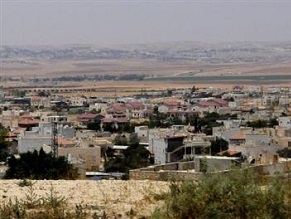|
World Jewish News

The Bedouin village of Hura in southern Israel
|
Israel slams ‘ignorant’ UN condemnation of Bedouin human rights bill
31.07.2013, International Organizations The Israeli foreign ministry on Tuesday issued a belated rebuttal to a UN statement condemning a government bill regularising the rights of the Bedouin population living in the Israeli Negev desert, on the grounds that “it displays ignorance and lack of acquaintance with the subject matter”.
The foreign ministry took umbrage with familiar foe UN High Commissioner for Human Rights Navi Pillay’s assertion last Thursday that the proposed Prawer-Begin legislation “will accelerate the demolition of the entire Bedouin communities, forcing them to give up their homes, denying their rights to land ownership, and decimating their traditional culture and social life in the name of development”.
Urging Israel ''to reconsider their apparent plans to demolish up to 35 Bedouin villages resulting in the alleged displacement of 40,000 Arab Bedouins from their historic communities,'' Pillay insisted that “as citizens of Israel, the Arab Bedouins are entitled to the same rights to property, housing and public services as any other group in Israel”. ““The Government must recognise and respect the specific rights of its Bedouin communities, including recognition of Bedouin land ownership claims,” she continued.
Israeli authorities have however disputed Pillay’s assessment of the facts, with the foreign ministry claiming the bill seeks to embed into law the very access to property, housing and public services for Bedouin communities that the commissioner demands as their natural right as Israeli citizens. Invoking Supreme Court approval of the bill as justification for its defence against Pillay’s attack, the foreign ministry statement further disputes her estimation of the scale of the supposed effect on Bedouin communities, slamming her “raw generalisation of entire populations, whereas their characterisation and their alleged grievances are of concern to only a small proportion of the Bedouin population in the Negev”.
A statement by Israeli Premier Benjamin Netanyahu’s office in January confirmed cabinet had approved the bill to formalise the status of Bedouin settlement in the Negev, after Minister Benny Begin held extensive consultations with 1,000 representatives of the Bedouin community and their associated organisations to draft the legislation.
The statement stressed that Israeli authorities had further incorporated recommendations of a specially-convened commission under the leadership of retired Supreme Court judge Eliezer Goldberg, who proposed that a bill should “recognise - as much as possible - each of the unrecognised villages in which there is a minimal mass of residents, such as will be determined, and which will be able to bear municipal status, and on the condition that such recognition will not contravene the district master plan”. The aim of this, continued the official comment, would be that as few as possible Arab Bedouins would be displaced from their settlements.
"The goal of this historic decision is to put an end to the spread of illegal building by Negev Bedouin and lead to the better integration of the Bedouin into Israeli society. All governments avoided dealing with this issue, but this brave decision will facilitate the continued development and prosperity of the Negev, for the benefit of all its residents,” said Netanyahu in response to the cabinet’s approval of the bill.
“From the Government's point-of-view, it is important that the plan be set in legislation. The Bedouin are citizens with equal rights and constitute an inseparable part of the Negev. There is the responsibility to assist the Bedouin in alleviating their plight and ensuring a more positive future for their children. Now, we expect the Bedouin to respond to this proposal,” added geologist and former Knesset member Begin, son of one-time PM Menachem Begin.
As well as those displaced Bedouins receiving full monetary or property compensation for their vacated settlement, the bill also facilitates a 1.2 billion shekel investment in a five-year plan “to promote the economic development and growth among Negev Bedouin, and will also invest hundreds of millions of shekels in developing infrastructures in Bedouin communities”.
The Israeli foreign ministry has previously responded to Pillay’s attacks on its human rights record, last November characterising her “strong political bias” against the Jewish State as clouding her declared “concern for the human rights of civilians” in the build-up to the contentious UN General Assembly vote on Palestinian non-member observer status. After Pillay professed herself “dismayed by the marked surge in the number of Palestinian civilians, including women and children, killed and injured over the past 48 hours as a result of Israeli military action” during the Gaza escalation, calling on “Israel to scrupulously meet its legal obligations to distinguish at all times between civilians and combatants, and to take precautions and all possible measures to avoid the loss of civilian life and damage to civilian property”, the foreign ministry declared Israel’s commitment to upholding international human rights law was “beyond doubt”.
“The High Commissioner ignores the fact that Hamas and other terrorist organizations are deliberately failing to distinguish - at all times - between civilians and combatants, and taking no precautions or any possible measures to avoid the loss of civilian life and damage to civilian property in Israel,” read Israel’s official comment.
Condemning Pillay’s insistence on directing “her criticism and harsh language to Israel”, the statement concluded: “The High Commissioner should unequivocally condemn the terrorist activities of Hamas and its partners, and their total disregard of all precautions to avoid loss of civilian life and damage to property. In doing so, the High Commissioner would do justice to human rights, instead of whitewashing Hamas and its terrorist partners.”
EJP
|
|
